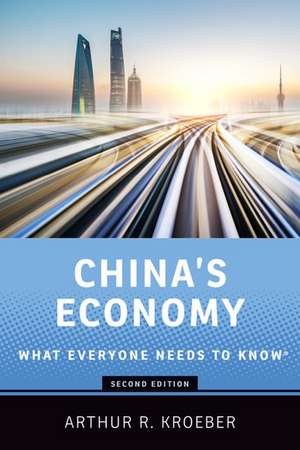China's Economy: What Everyone Needs to Know®: What Everyone Needs to Know®
Autor Arthur R. Kroeberen Limba Engleză Paperback – 24 sep 2020
Preț: 64.10 lei
Preț vechi: 73.03 lei
-12% Nou
Puncte Express: 96
Preț estimativ în valută:
12.27€ • 13.33$ • 10.31£
12.27€ • 13.33$ • 10.31£
Carte disponibilă
Livrare economică 21-27 martie
Livrare express 15-21 martie pentru 40.40 lei
Preluare comenzi: 021 569.72.76
Specificații
ISBN-13: 9780190946463
ISBN-10: 0190946466
Pagini: 464
Dimensiuni: 203 x 137 x 33 mm
Greutate: 0.52 kg
Ediția:2
Editura: Oxford University Press
Colecția OUP USA
Seria What Everyone Needs to Know®
Locul publicării:New York, United States
ISBN-10: 0190946466
Pagini: 464
Dimensiuni: 203 x 137 x 33 mm
Greutate: 0.52 kg
Ediția:2
Editura: Oxford University Press
Colecția OUP USA
Seria What Everyone Needs to Know®
Locul publicării:New York, United States
Recenzii
(This) Updated second edition explains how China's economy rose to its position today and where it might be headed in the coming years, highlighting China's increased relevance to the world since 2016.
If the notion of a middle way sounds intuitively appealing, Arthur Kroeber's book brings rigour to the debate to show why it is also the most likely outcome. A longtime China analyst now managing an independent research firm, he launches an assault, albeit courteously worded, on conventional wisdom from the two opposing camps. What emerges is a nuanced take on an economy facing serious challenges, ones that do not spell its collapse but could prove intractable all the same.
Thankfully Arthur Kroeber has [condensed] many years of studying and writing about the Chinese economy into a single-volume portrait accessible to the generalist. Aside from the clear descriptive prose and judicious organisation this book achieves two things. On the one hand it lays out a detailed framework of how China works that will be recognisable to experts, and accessible to newcomers, breaking the whole into a series of digestible parts. On the other hand it offers a layer of measured assessment aimed at addressing the full range of pressing issues affecting China.
Few have watched the development of the Chinese economy as closely as Arthur Kroeber. [China's Economy] is a wide-ranging and authoritative primer on the history and development of China's unique blend of decentralized economic authoritarianism.
If the notion of a middle way sounds intuitively appealing, Arthur Kroeber's book brings rigour to the debate to show why it is also the most likely outcome. A longtime China analyst now managing an independent research firm, he launches an assault, albeit courteously worded, on conventional wisdom from the two opposing camps. What emerges is a nuanced take on an economy facing serious challenges, ones that do not spell its collapse but could prove intractable all the same.
Thankfully Arthur Kroeber has [condensed] many years of studying and writing about the Chinese economy into a single-volume portrait accessible to the generalist. Aside from the clear descriptive prose and judicious organisation this book achieves two things. On the one hand it lays out a detailed framework of how China works that will be recognisable to experts, and accessible to newcomers, breaking the whole into a series of digestible parts. On the other hand it offers a layer of measured assessment aimed at addressing the full range of pressing issues affecting China.
Few have watched the development of the Chinese economy as closely as Arthur Kroeber. [China's Economy] is a wide-ranging and authoritative primer on the history and development of China's unique blend of decentralized economic authoritarianism.
Notă biografică
Arthur R. Kroeber is founding partner and managing director of Gavekal Dragonomics, a research firm focusing on China with offices in Hong Kong and Beijing. Before establishing Dragonomics in 2002, he spent 15 years as a financial and economic journalist in China and South Asia. He is senior non-resident fellow at the Brookings-Tsinghua Center in Beijing, adjunct professor at the Columbia University School of International and Public Affairs and at the NYU Stern School of Business, and a member of the National Committee on US-China Relations.

















